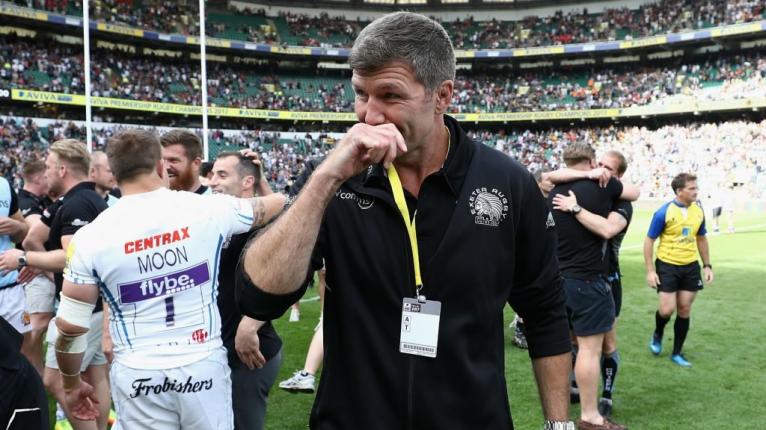Exeter's not so secret weapon in bid for domination moves into next phase

After winning their first ever Aviva Premiership title last season, Exeter Chiefs have taken a key, under the radar step towards consolidating their position at the summit of the competition.
Not only do they sit top of the Premiership table with two rounds of rugby left to play, but they also took a ground-breaking approach to their annual intake of academy players, handing out a staggering 14 senior academy contracts, nine of which went to players in their final year of the junior academy.
These are players finishing their final year of school and a Premiership club’s usual intake may vary from around three or four players, up to seven or eight for a class of particularly talented youngsters. For comparison, the only other Premiership club to have publicly confirmed their intake so far this season is Northampton Saints, who have contracted up five players to their senior academy for 2018/19.

The 14 players who Exeter have extended senior academy terms to are Richard Capstick, Flynn Elworthy, Barrie Karea, Sam Maunder, Joe Parker-Cook, Alfie Petch, Danny Southworth, Cory Teague and Rus Tuima, all of whom have come through the Exeter U18 side this season, as well as James Kenny, James McRae, Sam Morley, Max Norey and Joe Snow, who are either current Exeter University students and/or came through the Exeter junior academy last season.
There is certainly a fair amount of players worth watching over the next few years in that group, with Tuima, Capstick and Petch particularly worth keeping an eye on, but it is not a ground-breaking group in terms of potential stars. With so many players handed professional contracts, you might expect this group to be packed to the brim with future internationals, but in all honesty, there were probably stronger U18 classes this year.
Sale Sharks, Leicester Tigers, Saracens and Gloucester all arguably have more talented crops coming out this season and whilst success on the pitch at U18 level doesn’t always correlate to future success at senior level, Exeter failed to make it to Finals Day this season, sitting just outside the top six teams in the country.
What Exeter fans should be excited about, however, is the approach the club is taking to the salary cap.
The Devonians were the only Premiership club to make a profit in the 2016/17 fiscal year and given that they are currently spending up to the limit of the salary cap, they must be a little more creative with where they invest their money and with the way the salary cap works, that can be in the reserves of their younger, homegrown players.

The Premiership salary cap offers credits of up to £600,000 on homegrown players and this, effectively, allows teams to move beyond the current £7m ceiling and maintain larger squads, if they have the financial capability to do so.
Exeter are in an advantageous position to exploit that, not only having their accounts in the green, but also the homegrown players to use the credits on and the resulting space in the salary cap to bring in a host of senior academy players on the £30k flat rate deals which senior academy contracts command across the competition.
With a good coaching staff and a track record of developing and improving players, rather than just preparing them for the match at the weekend, investing heavily in younger players makes a lot of sense for Exeter.
This is an approach Saracens have used proficiently in recent years and it has been no coincidence that their recent success has correlated with them maintaining a key homegrown core to their squad and a large senior academy. The rotation opportunities a larger senior academy has allowed them has been one of the major components behind their ability to keep their team fresh and competitive throughout the season.
Thanks to their successful financial position off the field, Exeter are now able to exploit the salary cap for all its loopholes and credits and the future certainly looks bright in the south-west.
Being able to maximise the resources at their disposal is a key responsibility of any director of rugby and we can tentatively pencil this in as another tick on Rob Baxter’s coaching résumé.









































Comments on RugbyPass
Shame he won’t turn out for the Netherlands now they’re improving. U20s are Euro champs and in the U20 Trophy this year. The senior sides gets better every year too.
2 Go to commentsWill rugbypass tv be showing these games?
1 Go to commentsWell where do you start, the fact that England have a professional domestic league and Ireland’s is fully amatuer, that they have fully seperated professional squads at Fifteens and Sevens (7’s thinly disguised as GB), and Ireland have fully pro Sevens squad who loan some players back to the Semi-Professional Fifteens squad (moved from amateur for only a year or so) for a few games at 6N & RWC’s. The Women’s games is a shambles, and is at risk of killing itself by pushing for professionalism when the market isn’t really there to support it outside one or two countnries..
2 Go to commentsWayne Smith's input didn't have as much impact on the last final as Davison's red card for Thompson. England were 14 points up and flying when that happened.
2 Go to commentsBilly's been playing consistently well for 2 - 3 seasons now and deserves a look in at the top level. Ioane and ALB are still first choice but there needs to be injury cover and succession. His partnership with Jordie gives him first dibs you'd think. Go the Hurricanes.
3 Go to commentsIt’s not up to Wales to support Georgian Rugby. That’s up to International Rugby and Georgia. I sympathise with Georgia’s decent attempt to create this fixture. But for Wales the proposed match up is just a potential stick to beat them with and a potential big psychological blow that young Welsh team doesn’t need. (I’m Irish BTW.)
2 Go to commentsCale certainly looks great in space, but as you say, he has struggled in contact. At 23 years old, turning 24 this year, he should be close to full physical maturity and yet there exists a considerable gap in the power and physicality required for international rugby. Weight doesn’t automatically equate to power and physicality either. Can he go from a player who’s being physically dominated in Super rugby to physically dominating in international rugby in 1 or 2 years? That’s a big ask but he may end up being a late bloomer.
28 Go to commentsIf rugby wants to remain interesting in the AI era then it will need to work on changing the rules. AI will reduce the tactical advantage of smart game plans, will neutralize primary attacking weapons, and will move rugby from a being a game of inches to a game of millimetres. It will be about sheer athleticism and technique,about avoiding mistakes, and about referees. Many fans will find that boring. The answer is to add creative degrees of freedom to the game. The 50-22 is an example. But we can have fun inventing others, like the right to add more players for X minutes per game, or the equivalent of the 2-point conversion in American football, the ability to call a 12-player scrum, etc. Not saying these are great ideas, but making the point that the more of these alternatives you allow, the less AI will be able to lock down high-probability strategies. This is not because AI does not have the compute power, but because it has more choices and has less data, or less-specific data. That will take time and debate, but big, positive and immediate impact could be in the area of ref/TMO assistance. The technology is easily good enough today to detect forward passes, not-straight lineouts, offside at breakdown/scrum/lineout, obstruction, early/late tackles, and a lot of other things. WR should be ultra aggressive in doing this, as it will really help in an area in which the game is really struggling. In the long run there needs to be substantial creativity applied to the rules. Without that AI (along with all of the pro innovations) will turn rugby into a bash fest.
24 Go to commentsSouth Africa rarely play Ireland and France on these tours. Mostly, England, Scotland and Wales. I wonder why
2 Go to commentsIt was a let’s-see-what-you're-made-of type of a game. The Bulls do look good when the opposition allows them to, but Munster shut them down, and they could not find a way through. Jake should be very worried about their chances in the competition.
2 Go to commentsHats off to Fabian for a very impressive journey to date. Is it as ‘uniquely unlikely’ as Rugby Pass suggests, given Anton Segner’s journey at the Blues?
2 Go to commentsSad that this was not confirmed. When administrators talk about expanding the game they evidently don’t include pathways to the top tier of rugby for teams outside of the old boys club. Rugby deserves better, and certainly Georgia does.
2 Go to commentsLions might take him on if they move on Van Rooyen but I doubt he will want to go back, might consider it a step backwards for himself. Sharks would take him on but if Plumtree goes on to win the challenge cup they will keep him on. Also sharks showing some promising signs recently. Stormers and Bulls are stable and Springboks are already filled up. Quality coach though, interesting to see where he ends up
1 Go to commentsAnd the person responsible for creating a culture of accountability is?
3 Go to commentsMore useless words from Ben Smith -Please get another team to write about. SA really dont need your input, it suck anyway.
264 Go to commentsThis disgraceful episode must result in management and coach team sackings. A new manager with worse results than previous and the coaching staff need to coached. Awful massacre led by donkeys.
1 Go to commentsInteresting article with one glaring mistake. This sentence: “And between the top four nations right now, Ireland, France, South Africa, and New Zealand…” should read: And between the top four nations right now, South Africa, Ireland, New Zealand and France…”. Get it right wistful thinkers, its not that hard.
24 Go to commentsHow did Penny get the gig anyway?
3 Go to commentsNice write up Nick and I would have agreed a week ago. However as you would know Cale & co got absolutely monstered by the Blues back row of Sotutu, Ioane and Papaliti and not all of these 3 are guaranteed a start in the Black jumper. He may need to put some kgs before stepping up, Spring tour? After the week end Joe will be a bit more restless. Will need to pick a mobile tough pack for Wales and hope England does the right thing and bashes the ABs. I like your last paragraph but I would bring Swinton, Hannigan into the 6 role and Bobby V to 8
28 Go to commentsThe Crusaders can still get in to the Play Off’s. The imminent return of outstanding captain Scott Barrett and his All Black team mate Codie Taylor will be a big boost.There are others like Tamaiti Williams too. Two home games coming up. Fellow Crusader fans get there and support these guys. I will be.
2 Go to comments